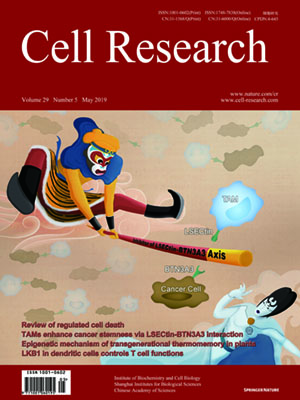
Advanced Search
Submit Manuscript
Advanced Search
Submit Manuscript
Volume 29, No 5, May 2019
ISSN: 1001-0602
EISSN: 1748-7838 2018
impact factor 17.848*
(Clarivate Analytics, 2019)
Volume 29 Issue 5, May 2019: 365-378
Di Liu1 , Qian Lu 1,2 , Xing Wang1 , Jun Wang3 , Ning Lu4 , Zefei Jiang5 , Xiaopeng Hao5 , Jianbin Li 5,6 , Jing Liu1 , Pengbo Cao1 , Guilin Peng1 ,Yuandong Tao1 , Dianyuan Zhao1 , Fuchu He1 and Li Tang 1,2
1 State Key Laboratory of Proteomics, Beijing Proteome Research Center, National Center for Protein Sciences·Beijing, Beijing Institute of Lifeomics, Beijing, China; 2Department of Biochemistry and Molecular Biology, Anhui Medical University, Hefei, Anhui Province, China; 3Department of immunobiology and Yale Cancer Center, Yale School of Medicine, New Haven, CT 06511, USA; 4Department of Orthopedics, PLA General Hospital, Beijing, China; 5Department of Breast Cancer, The Fifth Medical Center of PLA General Hospital,Beijing, China and 6Department of Medical Molecular Biology, Beijing Institute of Biotechnology, Beijing, China Correspondence: Fuchu He (hefc@nic.bmi.ac.cn) or Li Tang (tangli731@163.com)These authors contributed equally: Di Liu, Qian Lu
https://doi.org/10.1038/s41422-019-0155-6